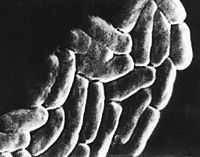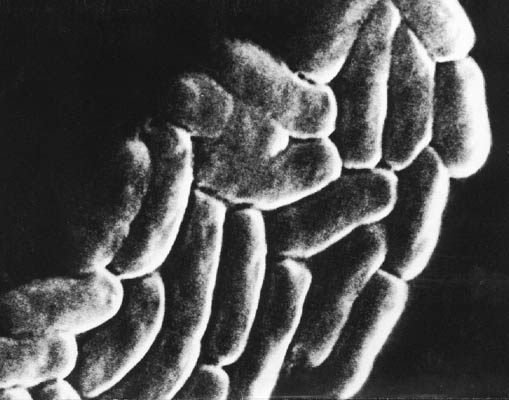Klebsiella pneumoniae: Difference between revisions
imported>Hirenkumar B Patel |
imported>Hirenkumar B Patel |
||
| Line 29: | Line 29: | ||
==Genome structure== | ==Genome structure== | ||
There are lots of research being done on sequencing the genome. Some places such as ([[Genome Sequencing Center]])at Washington University in St. Louis and ([[PLOS genetics]]). | There are lots of research being done on sequencing the genome. Some places such as ([[Genome Sequencing Center]])at Washington University in St. Louis and ([[PLOS genetics]]). At Genome Sequencing Center the genome was named Klebsiella pneumoniae subsp. pneumoniae MGH 78578 [http://www.ncbi.nlm.nih.gov/sites/entrez?Db=genome&Cmd=ShowDetailView&TermToSearch=21205] | ||
==Cell structure and metabolism== | ==Cell structure and metabolism== | ||
Revision as of 09:40, 21 April 2009
For the course duration, the article is closed to outside editing. Of course you can always leave comments on the discussion page. The anticipated date of course completion is May 21, 2009. One month after that date at the latest, this notice shall be removed. Besides, many other Citizendium articles welcome your collaboration! |
Classification
| Klebsiella pnemoniae | ||||||||||||||
|---|---|---|---|---|---|---|---|---|---|---|---|---|---|---|
 | ||||||||||||||
| Scientific classification | ||||||||||||||
| ||||||||||||||
| Binomial name | ||||||||||||||
| Pseudomonas putida |
Klebsiella pnemoniae is a species of Genus: Klebsiella. The Family: Enterobacteriaceae. The Order: Enterobacteriales. The Class: Gammaproteobacteria. The Phylum: Proteobacteria. and The Domain: Bacteria.
Image of Klebsiella pnemoniae
 Image is from Microbiologia!
[1]
Image is from Microbiologia!
[1]
Description and significance
K. pneumoniae is a gram negative bacteria. It is faculative aerobic, meaning it is has characteristic features of becoming aerobic and anaerobic. It is rod shaped and its dimensions are 2 X 0.5 micro meter. K. pneumoniae is also known as nasty bacteria. Klebsiella (pneumoniae) is commonly found in bacteria directed pneumoniae patients. Friedlancer C. Uber was the first person to discover that Klebsiella is a pathogenic bacteria that causes pneumoniae (2). The 160nm thick fine fiber capsule makes the bacteria pathogenic (3)[2]. This bacteria is found in different places in human body such as gastrointestinal tract and nasopharynx. (4) Naturally it is found in the soil, water, vegetables and sewage.
Genome structure
There are lots of research being done on sequencing the genome. Some places such as (Genome Sequencing Center)at Washington University in St. Louis and (PLOS genetics). At Genome Sequencing Center the genome was named Klebsiella pneumoniae subsp. pneumoniae MGH 78578 [3]
Cell structure and metabolism
Ecology
Pathology
References
(1)
(2)Friedlander C. Uber die scizomyceten bei der acuten fibrosen pneumonie. Arch Pathol Anat Physiol Klin Med 1882. 87:319-24
(3)Amako, K., Meno, Y., and Takade, A. "Fine Structures of the Capsules of Klebsiella pneumoniae and Escherichia coli K1". Journal of Bacteriology. 1988. Volume 170, No. 10. p. 4960-4962[4]
(4)Casewell M, Talsania H G. Predominance of certain klebsiella capsular types in hospitals in the United Kingdom. J Infect. 1979;1:77–79.